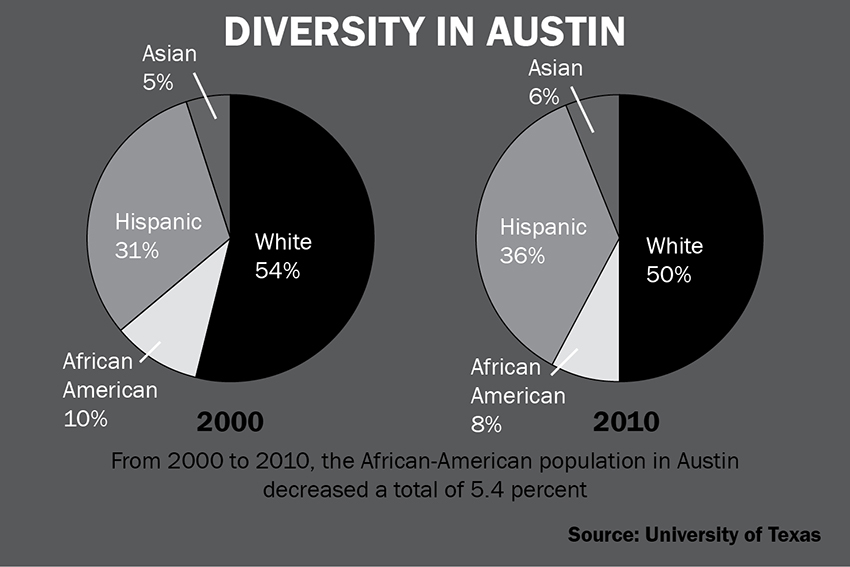As a city, Austin is topping the charts. In 2015 it was named Next Biggest Boom Town, Best City for Tech and even the Best Large City to Live In. These rankings hold true for all of Austin’s populations except one: African-Americans.
Austin’s black population is suffering despite the city’s rapid expansion in every other measurement. From 2000 to 2010, Austin experienced a 20.4 percent growth overall, while in the same time its black population has experienced a net loss of 5.4 percent. And it doesn’t stop there. Of the top 10 fastest-growing cities in the U.S., Austin was the only one to experience this, going from 15 percent to a projected 5 percent in just a few decades.
“If you think about it, it’s nothing new,” said Edmund Gordon, department chair of African and African diaspora studies. “Since times of slavery, blacks have been moved around Central Texas based on economic and political processes.”
Austin’s 1928 “Master Plan” relocated all public facilities to what is now east of Interstate 35 as a part of legal segregation efforts to concentrate the black population. Black households moved closer to the “Negro District” that held all of the black schools and public parks. The segregation has survived into the present. Now, for the second time in the last 100 years, Austin’s African-American community is undergoing relocation.
As Austin grows, students and young professionals demand housing, driving up property values, and with them property taxes. When they later abandon the neighborhood, the high prices remain. The situation is made worse because Texas taxes property instead of income. The amount you pay varies with the value of your home. Residents sitting on valuable land can’t resist the pull of cheaper and more spacious living in suburbs like Pflugerville, so they leave. With them move African-Americans’ businesses, churches and sense of community, which in turn deters African-Americans who are considering moving to Austin.
Even UT has contributed to the problem. In the 1980s, UT began buying up land east of I-35 for development, razing entire neighborhoods to build university facilities. The conflict came to a head in the Blackland neighborhood (named for its soil), where residents banded together to protect their property.
Bo McCarver wrote his 1995 thesis on the “Blackland Miracle” and now serves as the board president of the Blackland Community Development Corporation. He said that while the nonprofit has helped stabilize the neighborhood’s black population, he has seen neighbors leave because of the shifting culture.
“When you’re beside one of those [new developments], they are huge; it’s pretty intimidating,” McCarver said. “Some of them have towers, some of them have fences around them. How do you borrow a cup of sugar through a fence?”
While Austin’s economic growth has done great things for the city, we can’t allow it to come at the expense of the small communities that have helped make the city so attractive in the first place. Young adults looking to buy or rent property should make sure their arrival doesn’t replace established community members — many young renters just don’t realize the harm they cause. On a larger scale, the city and influential institutions like UT should join nonprofits in making affordable housing a priority.
With its rapid growth and rising status as a city of innovation, Austin is once again undergoing a shift in its black population. This time, we need to provide as much support as possible to preserve the history and heritage of African-Americans. This time, we have a chance to get it right.
Hallas is a Plan II freshman from Allen. Hallas is a senior columnist. Follow her on Twitter @LauraHallas.





















